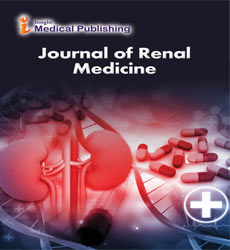Strategies to Improve Diagnosis and Treatment Outcomes in Renal Failure Management
Jean Marie*
Department of Anesthesiology, University of California, San Diego, USA
- *Corresponding Author:
- Jean Marie
Department of Anesthesiology, University of California, San Diego,
USA,
E-mail: marie@hotmail.com
Received date: February 24, 2024, Manuscript No. IPJRM-24-18916; Editor assigned date: February 27, 2024, PreQC No. IPJRM-24-18916 (PQ); Reviewed date: March 12, 2024, QC No. IPJRM-24-18916; Revised date: March 19, 2024, Manuscript No. IPJRM-24-18916 (R); Published date: March 26, 2024, DOI: 10.36648/ipjrm.7.2.16
Citation: Marie J (2024) Strategies to Improve Diagnosis and Treatment Outcomes in Renal Failure Management. Jour Ren Med Vol. 7 No.2:16.
Description
Renal failure, also known as kidney failure, is a complex medical condition that occurs when the kidneys lose their ability to function properly. This leads to a buildup of waste products and toxins in the body, which can result in various health complications. Renal failure is a serious medical condition that requires prompt diagnosis and appropriate treatment to prevent complications and improve outcomes. By understanding the causes, symptoms, diagnosis, treatment, and prevention strategies for renal failure, individuals can take proactive steps to protect their kidney health and overall well-being. If you or someone you know is experiencing symptoms of renal failure or has risk factors for the condition, it's essential to seek medical attention promptly for evaluation and management.
Types of renal failure
Renal failure can be broadly classified into two main types: Acute Renal Failure (ARF) and Chronic Renal Failure (CRF). ARF typically develops suddenly and is often reversible if treated promptly, while CRF progresses gradually over a longer period and is usually irreversible. Acute Renal Failure (ARF) can have various causes, including Acute Tubular Necrosis (ATN) caused by ischemia, toxins, or sepsis, severe dehydration or low blood volume (hypovolemia), kidney obstruction due to kidney stones, tumors, or an enlarged prostate, and certain medications such as Nonsteroidal Anti-Inflammatory Drugs (NSAIDs) and certain antibiotics. On the other hand, Chronic Renal Failure (CRF) is often associated with underlying health conditions such as diabetes mellitus, hypertension (high blood pressure), glomerulonephritis, Polycystic Kidney Disease (PKD), and autoimmune diseases like lupus and vasculitis. The symptoms of renal failure can vary depending on the type and severity of the condition. Common symptoms include decreased urine output or no urine output at all, swelling in the legs, ankles, or feet (edema) due to fluid retention, fatigue, weakness, shortness of breath, nausea, vomiting, confusion, difficulty concentrating, persistent itching, muscle cramps, high blood pressure, and anemia. These symptoms may develop gradually in the case of chronic renal failure or suddenly in the case of acute renal failure. Diagnosing renal failure typically involves a combination of medical history, physical examination, and various tests. Blood tests, including measurements of creatinine, Blood Urea Nitrogen(BUN), and electrolytes, can help assess kidney function. Urine tests, such as urinalysis, can detect abnormalities such as proteinuria (protein in the urine) and hematuria (blood in the urine). Imaging tests such as ultrasound, CT scans, or MRI scans may be used to visualize the kidneys and identify any structural abnormalities. In some cases, a kidney biopsy may be performed to examine a small sample of kidney tissue under a microscope.
Treatment for renal failure
Treatment for renal failure aims to manage symptoms, slow disease progression, and prevent complications. Depending on the type and severity of renal failure, treatment options may include medications, dialysis, and kidney transplant. Medications such as diuretics, phosphate binders, Erythropoiesis-Stimulating Agents (ESAs), and blood pressure medications may be prescribed to manage symptoms and control underlying conditions. Dialysis, either hemodialysis or peritoneal dialysis, may be necessary to remove waste products and excess fluid from the blood in cases of advanced renal failure. In severe cases of End-Stage Renal Disease (ESRD), where the kidneys have failed completely, a kidney transplant may be the best treatment option. In addition to medical treatment, lifestyle changes can also play a crucial role in managing renal failure and preventing complications. Following a kidney-friendly diet low in salt, potassium, and phosphorus can help reduce the workload on the kidneys and maintain overall health. Limiting fluid intake, quitting smoking, avoiding excessive alcohol consumption, and exercising regularly can also help improve kidney function and reduce the risk of complications. It's essential for individuals with renal failure to work closely with their healthcare providers to develop a comprehensive treatment plan that addresses their specific needs and circumstances. Preventing renal failure involves managing risk factors and adopting a healthy lifestyle. Managing underlying health conditions such as diabetes and hypertension is crucial for preventing kidney damage. Staying hydrated by drinking plenty of water, avoiding nephrotoxic substances, maintaining a healthy weight, and avoiding smoking and excessive alcohol consumption can also help protect kidney health. Regular medical check-ups are essential for monitoring kidney function and detecting any signs of kidney disease early. By taking proactive steps to protect kidney health, individuals can reduce their risk of developing renal failure and improve their overall quality of life.
Open Access Journals
- Aquaculture & Veterinary Science
- Chemistry & Chemical Sciences
- Clinical Sciences
- Engineering
- General Science
- Genetics & Molecular Biology
- Health Care & Nursing
- Immunology & Microbiology
- Materials Science
- Mathematics & Physics
- Medical Sciences
- Neurology & Psychiatry
- Oncology & Cancer Science
- Pharmaceutical Sciences
